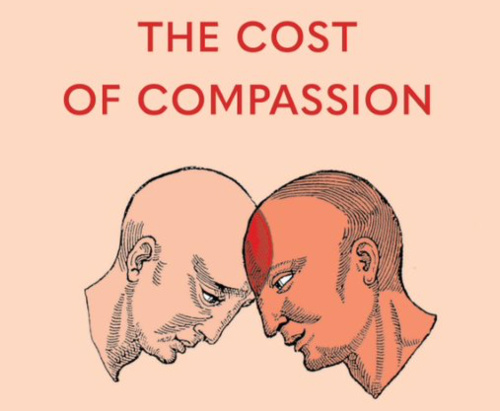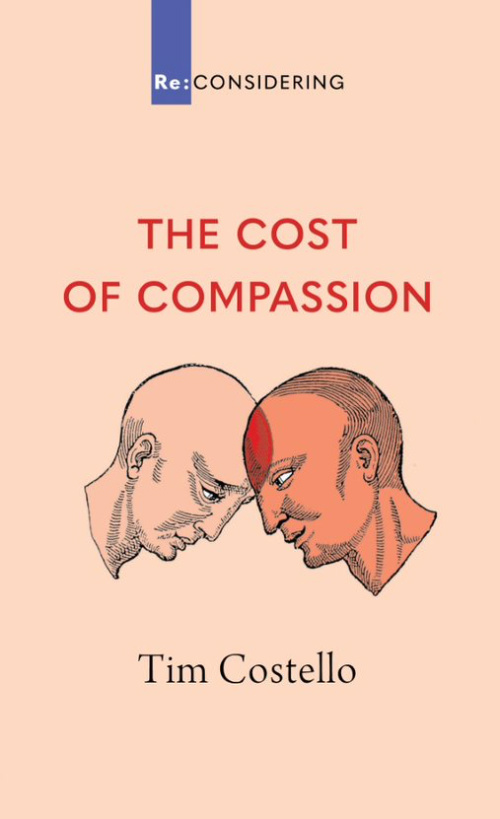
JO KADLECEK review Tim Costello’s latest book, ‘The Cost of Compassion’…
Tim Costello
The Cost of Compassion (Re:CONSIDERING series)
Centre for Public Christianity & Acorn Press, Sydney, Australia 2020
ISBN-13: 978-0647530931

“Costello includes compelling and perspective-building anecdotes from his global and Australian ministries, the kind that confront our daily comfortableness (ie, traumatised refugee camps, genocidal impacts, extreme poverty). Then he provides various insights from religious, secular and Biblical sources, and the result is not a formula but a helpful framework for wrestling toward a lifestyle of suffering with others.”
In a year bombarded with global struggles and social isolation, it’s probably no accident that Tim Costello’s new book, The Cost of Compassion, has arrived on the scene. Costello’s little book confronts the big questions that have long motivated the Baptist preacher from Melbourne, while fitting neatly into the organisational missions of the book’s publishers, the Centre for Public Christianity and Acorn Press – both arms of Bible Society Australia – in helping readers respond thoughtfully to contemporary life.
In some ways, though, The Cost of Compassion could be seen as a personal manifesto for Costello who, as a former CEO of World Vision Australia and current Fellow with CPX (and Sight advisory board member), draws on a lifetime of learning what it means to suffer with (the definition of compassion) those in need. He writes with honesty and conviction as a 65-year-old hoping to offer some wisdom and application from a life spent in service, and even comes to some surprising distinctions about compassion fatigue, diet and distance for his own life.
But the book is also a public apologetic for “the necessity of compassion” in a culture where self-centredness and political posturing is easier than the hard work of serving the common good, made perhaps more so because of the pandemic. Yet Costello warns, “[Compassion] is not an add-on for our lives as individuals and our life together. If we cannot practice it in the way that we engage in the political process, then our efforts to shape society itself to be more compassionate will be less and less effective.”
Nonetheless, those looking for an easy formula to create such a compassionate society won’t find it here. Which is both frustrating and refreshing. Frustrating because we want simple steps and fixes, as if it’s possible to reduce something that is admittedly costly and messy into a to-do list. Compassion, we all know, is not simple; it is complicated and hard and tricky to navigate.
And that is exactly why the book is also refreshing. Costello includes compelling and perspective-building anecdotes from his global and Australian ministries, the kind that confront our daily comfortableness (ie, traumatised refugee camps, genocidal impacts, extreme poverty). Then he provides various insights from religious, secular and Biblical sources, and the result is not a formula but a helpful framework for wrestling toward a lifestyle of suffering with others.
In five brief chapters, each titled with a question, Costello explores whether compassion is natural, practical, necessary, possible and who it benefits. The questions are not so much answered as dissected and offered through the lens of his lived theology and experience, leaving readers again with the challenge (and framework) to explore such questions in their own contexts.
“Compassion is worth re-considering,” he says in his introduction, pointing to the premise that compassion is a no-brainer for any human with a heart [and a mind] interested in doing good. After all, who’s opposed to compassion?
“Whether right or left, religious or secular, Confucian or Christian, carnivore or vegetarian…it seems we have a consensus: compassion is good,” Costello writes. And though compassion might to be part of every human’s DNA, how we prioritise it will determine what it looks like in our daily and lifelong interactions with others – and with ourselves.
Which might be why Costello ends his book by reminding us: “As we think about compassion, it’s easy to fall into the trap of seeing ourselves only as the people who show compassion to those other people, those who need it. Yet human frailty and vulnerability is universal. Everybody needs compassion and everybody has the capacity to give it. It must be a two-way street.”





